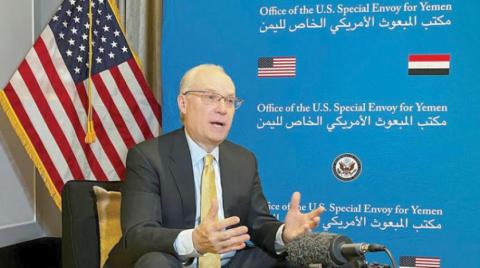
No doubt much attention will this week be focused on the economic workshop in Manama that will discuss Jared Kushner’s “Peace to Prosperity” document. This comfortable setting will also no doubt witness lofty ideals and ambitious declarations of grandiose transformations for the region.
One could pick any number of topics and issues that just do not figure in this much-awaited so-called plan. Refugees and occupation do not get a mention, neither does Jerusalem, one of the conflict’s most sensitive issues.
This city is divided and contested but, in Trumpland, it is the eternal, undivided capital of Israel, having been illegally annexed in 1980. On the ground, the divisions are very real. The stark contrast between the Israeli Jewish and the Palestinian Arab areas is akin to comparing Upper East Side Manhattan and the Bronx, but far worse, as you have to add in barriers, checkpoints, refugee camps and institutionalized discrimination.
Palestinians in East Jerusalem face a sustained assault on their very presence. This affects nearly every aspect of their lives. Reversing this is an essential ingredient of any conceivable peace.
If Palestinian Jerusalemites read the Kushner document, they would crave the property rights guarantees that it insists are necessary for investors, though not it seems Palestinians. Palestinian property is eternally vulnerable. April saw the highest number of home demolitions in East Jerusalem since the UN started keeping records, with 63 homes and other structures demolished. Between 2009 and 2015, the monthly average was six. Does this matter? The UN says that a third of Palestinian buildings in East Jerusalem lack the required Israeli building permit, meaning that around 100,000 Palestinians could be displaced. Remember that the core reason for this is simply Palestinians can barely ever get permits. The cruelest element of the Israeli policy is self-demolitions. Palestinians frequently have to flatten their own homes or face punitive fines, legal fees or even imprisonment. Watching this happen is heartbreaking.
Palestinians in East Jerusalem face a sustained assault on their very presence. This affects nearly every aspect of their lives.
Chris Doyle
Israeli demolitions are not just designed to punish Palestinians or just to demoralize them and encourage them to leave the city. It is part of a systematic process of expanding illegal Jewish settlements. Settlers do not face the threat of demolitions. Many of their homes are built on private Palestinian land. Settler numbers have increased to about 210,000 in East Jerusalem.
Settlements are expanding on the edges of the city but also right in the historic center. Extreme settler organizations are threatening an entire Palestinian community at Wad Yasul in the shadow of the Old City. This entails the demolition of 60 homes, impacting 500 residents. This is all part of a settler-backed City of David theme park plan that even includes the country’s largest recreational zip line.
Yet all this is not ad hoc. Demolitions adhere to specific long-term plans of the Jerusalem municipality going back to the 1990s, which aim to entrench both Israeli “sovereignty” and ensure an Israeli Jewish majority in the city. To achieve the demographic majority for Jews, Palestinian homes have to be demolished. A key component of these plans has been to make life impossible for Palestinians, denying them equal services and even revokingresidency rights in the city for nearly 15,000 Palestinians. Emptying the city of Palestinians — ethnic cleansing — has not worked, as many Palestinians returned to Jerusalem to protect their rights there. Plans also included redrawing the boundaries of Jerusalem, which would hive off several areas of high Palestinian population outside the city’s borders, while incorporating significant settlements. This has the support of Prime Minister Benjamin Netanyahu, who backs the excision of Palestinians neighborhoods from the city.
Not all Israeli political forces agreed with this approach, often for electoral considerations, such as the proportion of Orthodox Jews in the city. Last year, shortly after the Trump administration had formally recognized Jerusalem as Israel’s capital, the municipality published a five-year plan that was designed to strengthen Israeli sovereignty over the whole city and take more direct control over Palestinian areas. This includes forcing Palestinian schools in occupied East Jerusalem to adopt the Israeli curriculum. It would also register lands in East Jerusalem in Israel’s own registry, which could put many more Palestinian homes at risk from Israeli bulldozers. Some Israeli politicians want to reverse the decades-long neglect of Palestinian areas to demonstrate the unity of the city. Palestinians receive a tiny proportion of municipal services despite paying municipal taxes. This is very evident from strolling around their areas.
Ignoring Jerusalem, as Kushner’s initial economic plan does, is reckless. The city has the potential to wreck any chances for peace, as history shows. The US recognition has only made the climate even more radioactive. The efforts of the occupying power to cleanse areas of Palestinians and annex areas to the city must be thwarted and reversed. The positions of the Trump administration on the city have only served to turbocharge settler efforts to build, annex and demolish, seeing this period as the optimum political moment to crush all Palestinian hopes. If anything, when a new Israeli government is in place sometime after Sept. 17, Palestinians will be in a massive fight to hold on to their position in the city.
An honest peace broker would be presenting a blueprint with plans for the city that are inclusive and shared — a capital both for Israel and a state of Palestine. Under that paradigm, development plans would assist Palestinians in Jerusalem, not just to develop their areas and build legally, but to reconnect meaningfully with their brethren in the rest of Palestine so Jerusalem would reclaim its place at the heart of the West Bank, politically, culturally and economically. It appears the Palestinians may be waiting a long time.










